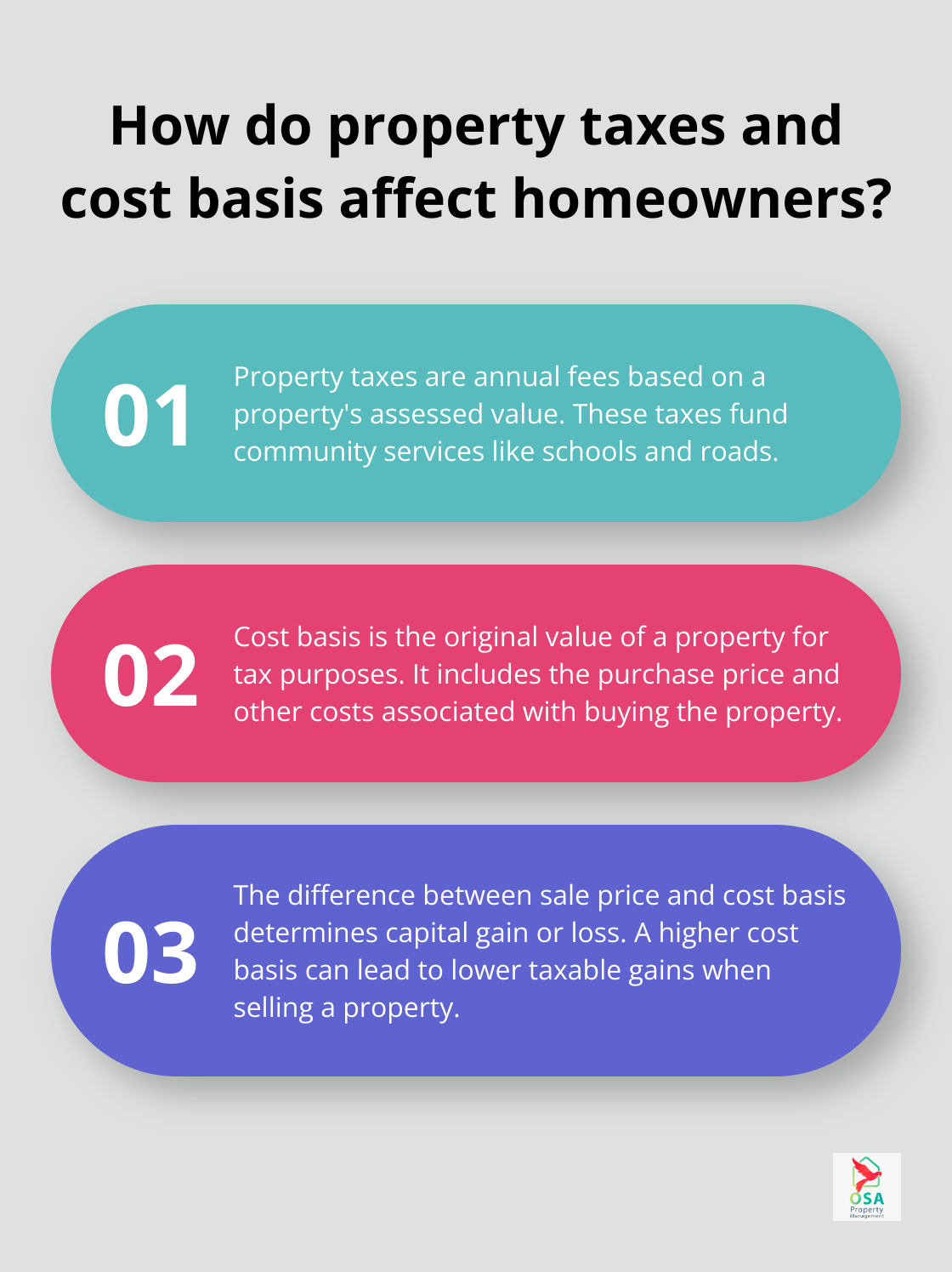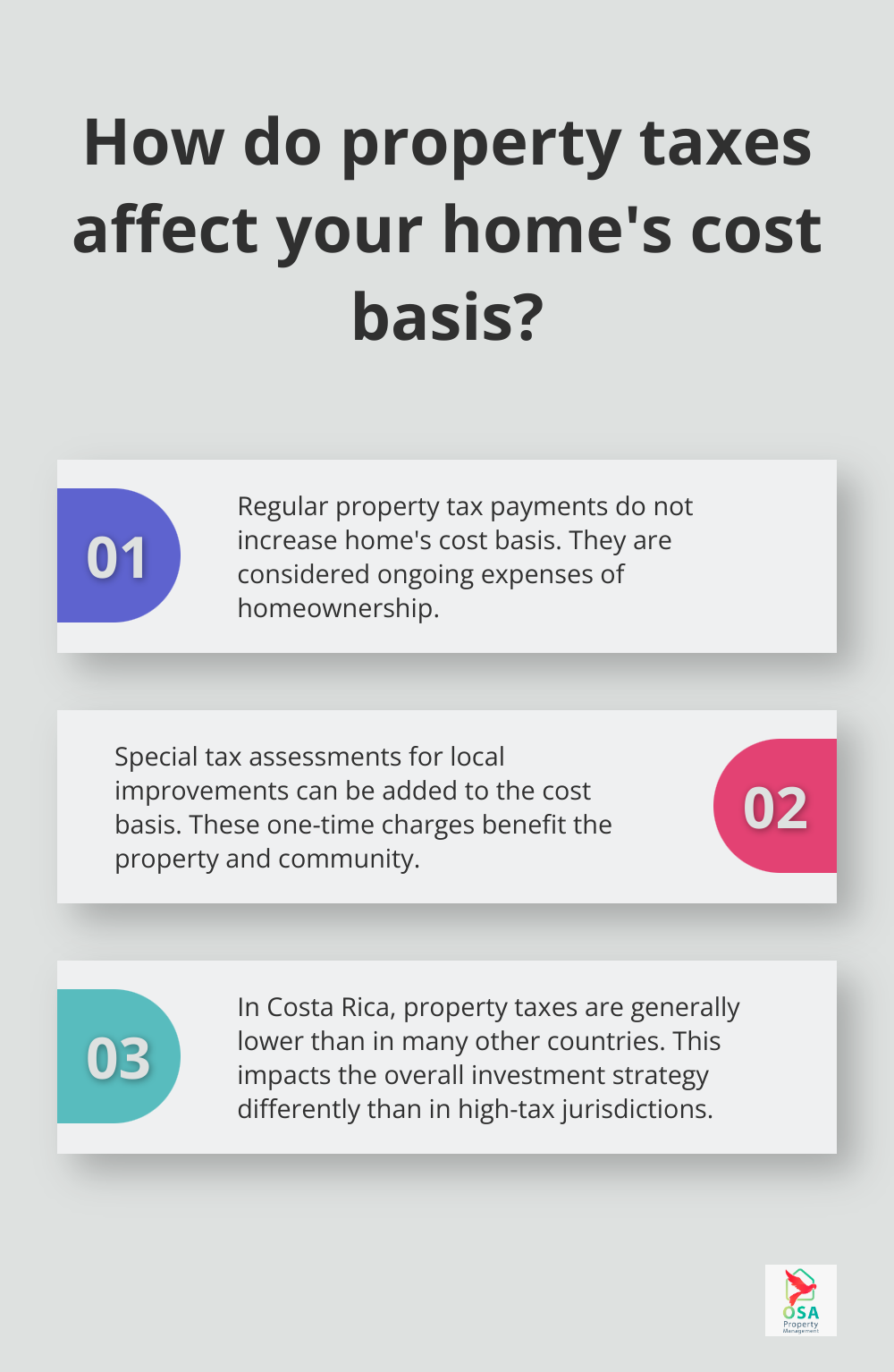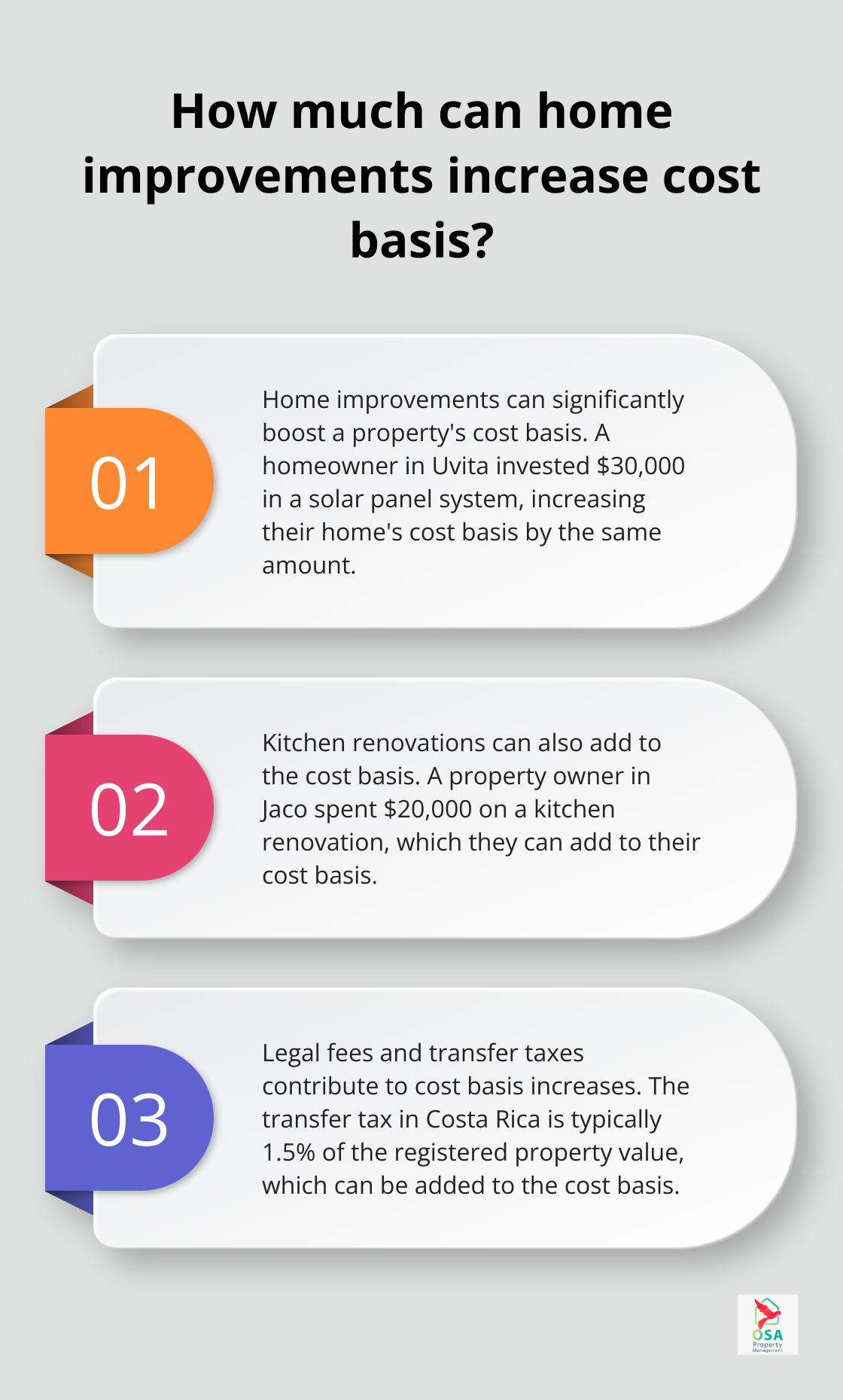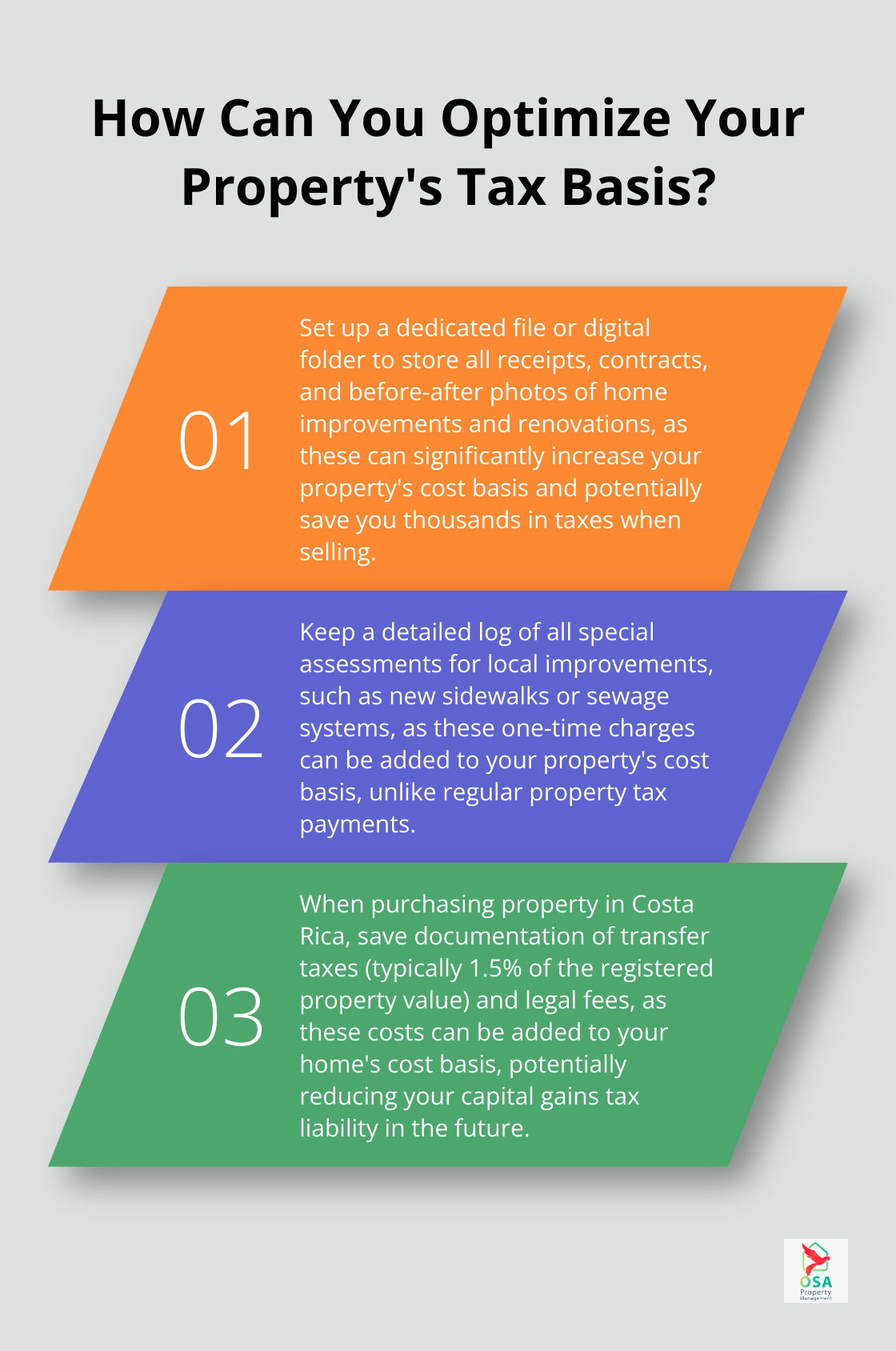At Osa Property Management, we often field questions about property taxes and their impact on home ownership. One common query is whether property taxes add to cost basis.
Understanding the relationship between property taxes and your home’s cost basis is crucial for both homeowners and investors. This knowledge can significantly affect your tax liability when selling your property.
In this post, we’ll explore how property taxes influence cost basis and provide practical insights to help you make informed decisions about your real estate investments.
What Are Property Taxes and Cost Basis?
Understanding Property Taxes
Property taxes are annual fees homeowners pay to local governments based on their property’s assessed value. These taxes fund essential community services like schools, roads, and emergency services. Property tax rates vary significantly across different regions in Costa Rica.
Defining Cost Basis
Cost basis is the original value of your property for tax purposes. It includes the purchase price and other costs associated with buying the property. Your cost basis plays a key role when you sell your property, as it determines your capital gains or losses.
Impact of Cost Basis on Taxes
When you sell your home, the difference between your sale price and cost basis determines your capital gain or loss. A higher cost basis can lead to lower taxable gains, potentially saving you thousands in taxes. For example, if you bought a house for $200,000 and sold it for $300,000, your capital gain would be $100,000. However, if your cost basis was $250,000 due to improvements, your taxable gain would only be $50,000.
The Importance of Tracking Cost Basis
Keeping accurate records of your property’s cost basis is essential. This includes saving receipts for significant improvements, which can increase your cost basis. The National Association of Realtors reports that home improvement spending reached $420 billion in 2020, highlighting how common it is for homeowners to invest in their properties.
Property Taxes and Their Relation to Cost Basis
Regular property tax payments do not increase your home’s cost basis. These are considered ongoing expenses of owning a property. However, certain one-time tax assessments for local improvements (like new sidewalks or sewage systems) can be added to your cost basis.

In Costa Rica, property tax rates are generally lower than in many other countries, typically around 0.25% of the property’s registered value. This can benefit homeowners and investors who want to minimize ongoing costs while still benefiting from potential property value appreciation.
As we move forward, let’s explore how property taxes specifically affect your home’s cost basis and examine some exceptions to the general rule.
How Property Taxes Impact Your Home’s Cost Basis
Regular Property Tax Payments
Property taxes represent a significant expense for homeowners, but their relationship with your home’s cost basis isn’t straightforward. Your regular annual property tax payments do not increase your home’s cost basis. These taxes are considered ongoing expenses of homeownership, similar to utility bills or maintenance costs. They’re deductible in the year you pay them, but they don’t add to your property’s value for tax purposes when you sell.
Special Tax Assessments
While regular property taxes don’t affect your cost basis, special tax assessments for local improvements can. These are one-time charges for projects that benefit your property and the community. For example, if your local government levies a special assessment to install new sidewalks or improve the sewage system, you can add this cost to your home’s basis.

In Costa Rica, such assessments are less common than in some other countries. However, when they do occur, they can be significant. For instance, a property owner in Jaco recently faced a special assessment for road improvements in their neighborhood. This amount was added to their property’s cost basis, potentially reducing their capital gains tax if they decide to sell in the future.
Practical Examples
Let’s look at a practical example to illustrate how this works:
Imagine you purchased a home in Uvita for $300,000. Over five years, you paid property taxes. During this time, there was also a special assessment for new street lighting. If you sell the house for $350,000, your cost basis would be the purchase price plus the special assessment. The regular property taxes don’t factor into this calculation.
Record-Keeping Importance
To take advantage of any potential increases to your cost basis, meticulous record-keeping is essential. Keep detailed records of all property-related expenses, including special assessments and improvements. This practice can save you significant money when it’s time to sell.
The Costa Rican Context
In Costa Rica, property taxes are generally lower than in many other countries. While this is beneficial for ongoing costs, it also means that the impact of property taxes on your overall investment strategy might be less significant than in high-tax jurisdictions.
However, the lower tax rate doesn’t diminish the importance of understanding how these taxes interact with your property’s cost basis. Even small additions to your basis can add up over time, potentially leading to substantial tax savings when you sell your property.
Understanding how property taxes affect your home’s cost basis is just one piece of the puzzle. Next, we’ll explore other factors that can increase your home’s cost basis, providing you with a comprehensive view of this important aspect of property ownership.
Boosting Your Home’s Cost Basis Beyond Property Taxes
Home Improvements and Renovations
One of the most effective ways to increase your home’s cost basis involves substantial improvements and renovations. These upgrades enhance your property’s value or extend its useful life. In Costa Rica, popular improvements include solar panel installations, kitchen and bathroom upgrades, or pool additions.

A homeowner in Uvita invested $30,000 in a solar panel system. This investment reduced their energy costs and increased their home’s cost basis by the same amount. Another property owner in Jaco spent $20,000 on a kitchen renovation, which they can add to their cost basis.
Keep detailed records of these improvements. Save all receipts, contracts, and before-and-after photos. These documents will prove invaluable if the IRS questions your cost basis calculations.
Legal Fees and Transfer Taxes
When you purchase a property in Costa Rica, various legal fees and transfer taxes apply. You can often add these costs to your home’s cost basis. The transfer tax in Costa Rica typically amounts to 1.5% of the registered property value. For a home purchased at $300,000, you’d pay $4,500 in transfer tax, which you can add to your cost basis.
Legal fees for title searches, document preparation, and other closing costs also qualify for inclusion. These fees can amount to several thousand dollars, providing a significant boost to the property’s cost basis.
Assessment Fees for Local Improvements
Property taxes and garbage fees can be paid quarterly – at the end of March, June, September, and December – or they can all be paid at once for the entire year. Special assessment fees for local improvements often increase your cost basis, unlike regular property taxes. Local governments levy these one-time charges for projects that benefit your property and the surrounding area.
In Costa Rica, these assessments occur less frequently than in some countries, but they do happen. A community in Manuel Antonio recently faced a special assessment for road improvements. Homeowners who paid this fee can add it to their property’s cost basis.
You must distinguish between regular maintenance (which doesn’t increase cost basis) and substantial improvements. If you’re unsure, consult with a local tax professional for guidance.
Tracking and Documentation
Proper tracking and documentation of these additional factors can potentially increase your home’s cost basis by tens of thousands of dollars. This increase can lead to significant tax savings when you decide to sell your property.
Maintain a detailed log of all improvements, renovations, and special assessments. Include dates, costs, and descriptions of the work done. This information will prove invaluable when calculating your cost basis for tax purposes.
Professional Assistance
Navigating the complexities of cost basis calculations can challenge even experienced property owners. Consider seeking professional help to ensure you maximize your cost basis while complying with all relevant tax laws. Osa Property Management (with over 19 years of experience in Costa Rica) offers expert guidance on these matters, helping property owners make informed decisions about their investments.
Final Thoughts
Property taxes do not add to cost basis, but special assessments for local improvements can increase it. This distinction affects your tax liability when selling property in Costa Rica. Accurate expense tracking proves essential for homeowners and investors to potentially save thousands in taxes upon sale. We recommend staying informed about local tax laws and regulations to navigate the unique property tax landscape in Costa Rica effectively.

Professional assistance can help you maximize returns while staying compliant with local regulations. Osa Property Management offers expert guidance on property management, including tax considerations in Costa Rica’s real estate market. Our team (with extensive experience) can support you in making informed decisions about your property investments.
Understanding the impact of property taxes and other factors that increase basis can significantly affect your long-term financial outcomes in real estate. Detailed record-keeping positions you to make the most of your property investments in Costa Rica. Stay informed and maintain thorough documentation to optimize your real estate ventures in this beautiful country.

